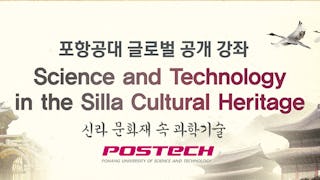- Browse
- Archaeology
Results for "archaeology"
 Status: PreviewPreviewU
Status: PreviewPreviewUUniversity of Houston
Skills you'll gain: Ancient History, International Relations, Human Factors, Failure Analysis, Engineering, Safety Assurance
4.4·Rating, 4.4 out of 5 stars435 reviewsMixed · Course · 1 - 3 Months
 Status: PreviewPreviewP
Status: PreviewPreviewPPohang University of Science and Technology(POSTECH)
Skills you'll gain: Ancient History, Art History, Engineering, Scientific, and Technical Instruments, Materials science, Architecture and Construction, Civil Engineering, Architectural Design, Structural Engineering, Instrumental Music, Hydraulics, Geometry, Manufacturing Processes, Vibrations
4.8·Rating, 4.8 out of 5 stars60 reviewsBeginner · Course · 1 - 3 Months
 Status: PreviewPreviewT
Status: PreviewPreviewTTel Aviv University
Skills you'll gain: Political Sciences, World History, International Relations, Policy Analysis, Culture, Socioeconomics, Governance
4.8·Rating, 4.8 out of 5 stars517 reviewsMixed · Course · 1 - 3 Months
 Status: Free TrialFree TrialU
Status: Free TrialFree TrialUUniversity of Illinois Urbana-Champaign
Skills you'll gain: Data Mining, Text Mining, Innovation, Data Integration, Unstructured Data, Big Data, Data Analysis, Exploratory Data Analysis, Data Presentation, Data Visualization Software, Feature Engineering, Analysis, Model Evaluation, Natural Language Processing, Technical Writing, Classification Algorithms, Algorithms
4.4·Rating, 4.4 out of 5 stars48 reviewsMixed · Course · 1 - 3 Months
 Status: Free TrialFree TrialU
Status: Free TrialFree TrialUUniversity of Colorado System
Skills you'll gain: Culture, Cultural Diversity, digital literacy, Intercultural Competence, Diversity Awareness, Human Development, World History, Psychology, Ethical Standards And Conduct, Social Sciences, Social Impact, Sociology
Beginner · Course · 1 - 3 Months
Searches related to archaeology
In summary, here are 5 of our most popular archaeology courses
- A Brief History of Human Spaceflight: University of Houston
- Science and Technology in the Silla Cultural Heritage: Pohang University of Science and Technology(POSTECH)
- The Emergence of the Modern Middle East - Part II: Tel Aviv University
- Data Mining Project: University of Illinois Urbana-Champaign
- Exploring the Origins of Selfhood: University of Colorado System










